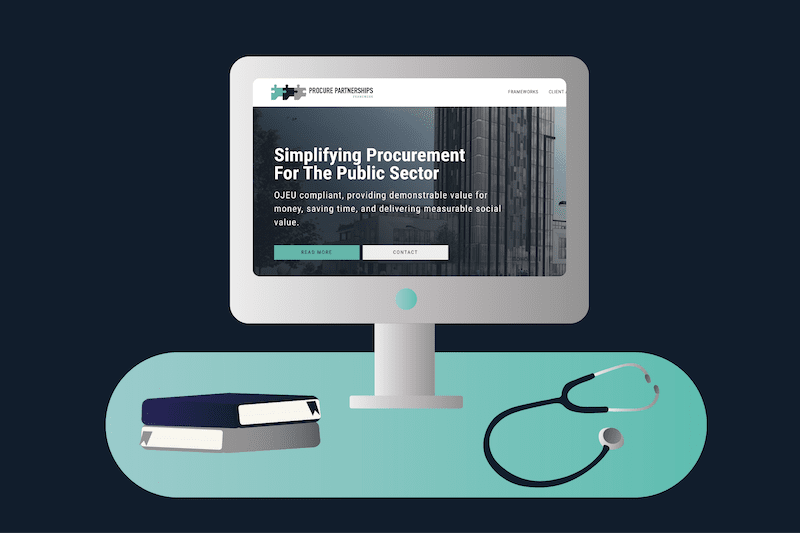Clinical Commissioning Groups (CCGs) are NHS organisations set up to orchestrate the delivery of NHS services in England. They control £79.9 billion of NHS funding, the equivalent of 56% of England’s overall health budget. A total of 135 CCGs across the country replaced Primary Care Trusts to manage a majority share of the Department of Health and Social Care’s annual spend, so it is crucial that clinical commissioning groups understand effective procurement, not only to ensure value for money, but to deliver improved services and outcomes for local patients and communities.
In this article, with support from Conamar and Howarth Litchfield, Framework Director Robbie Blackhurst will explore how Clinical Commissioning Groups can benefit from procurement and the call-off methods and funding available to them.
How Clinical Commissioning Groups Use Procurement
Clinical Commissioning Groups have been GP-led since 2010 when the Government announced their ‘Equity and Excellence: Liberating the NHS’ white paper, later legalised as the Health and Social Care Act 2012. The driving force behind this shift of control was to champion a clinically motivated commissioning system that was sympathetic to the needs of patients. The Commissioning Development Directorate published a procurement guide for commissioners of NHS-funded services, which identifies three key methods to secure services:
• Through contracts with existing providers inherited from Primary Care Trusts (PCTs) and through future variations of these contracts.
• Through enabling patients, when they are referred for a particular service, to choose from Any Qualified Provider (AQP) that wants to provide the service.
• Through tendering for a new or replacement service (either via competitive tender or direct award call off methods to appoint one exclusive provider or a group of providers to facilitate that service).
Both the AQP and tendering routes are secured via a procurement process. This can really benefit CCGs as they have a responsibility to work within the statutory frameworks and have a legal obligation to adhere to legislation that governs the award of contracts by public bodies, including the Public Contracts Regulations 2006. All contracts must conform to the rules of transparency, equal treatment and non-discrimination set out by the regulations. The guidelines also stipulate ‘CCGs will need to comply with regulations implemented under section 75 of the Health and Social Care Act, which will place requirements on commissioners to ensure that they adhere to good practice in relation to procurement, do not engage in anti-competitive behaviour, and protect and promote the rights of patients to make choices about their healthcare.’ With such a big responsibility for ensuring procurement processes are compliant, CCGs can find procurement frameworks a huge support in ensuring good value, compliancy and delivering on desired outcomes. All high value tender opportunities must be advertised through NHS Supply2Health and where appropriate the Find a Tender Service (FTS).
Procurement Call Off Options Available to Clinical Commissioning Groups
Once a decision has been reached that a new or replacement healthcare service provider is required, it is important to consider what procurement options are available and which call off methods are best suited to the type of contract to be secured.
Any Qualified Provider – this is a route determined by patient choice. Under AQP any service provider assessed as passing rigorous quality prerequisites who can deliver services that meet NHS pricing, in accordance with the NHS Standard Contract, is eligible to deliver the service. This route is more suited to planned healthcare procedures than to emergency services, e.g., podiatry or hearing services, where time and consideration can be afforded by the patient as to the most appropriate service provision for their needs.
Competitive Tender Process – this is the most popular route for the procurement of clinical services. If there are many potential providers for a service and an AQP strategy is not suitable, a competitive tender process is a beneficial way to award a contract. A competitive process must ensure fairness and demonstrate value for money. This can be done via a Two Stage Competition process to restrict the number of providers invited to bid; making the process more cost effective and easier to manage. Or a Single Stage Competition process can be used for more complex requirements where more detailed responses may be required from bidders.
Direct Award – no competition is required. This is an appropriate route where analysis of the market determines that one provider or limited group of providers can meet the requirements of the contract. This route is usually taken where there is an urgent clinical need.
With all procurement routes it is important that CCGs consider any conflicts of interest to ensure processes are fair and legally compliant throughout.
Elisa Berry, Director, Howarth Litchfield, commented: “As designers, Howarth Litchfield are fortunate to be able to work with practices and CCGs from the outset of a project to help articulate their needs and translate this into architectural proposals. We guide our clients through the design, planning, procurement, and construction processes to finally see their project become reality. We work across many sectors and the primary challenge we face working within the healthcare sector, more so than any sector, is the tiered approvals process and associated documentation which we have learned to adapt to in terms of programme and budget. Our reputation sees our client base rapidly growing and we always welcome the opportunity of a new challenge”.
Funding Available to Clinical Commissioning Groups
Funding is distributed from central Government’s health budget using allocation formulas to determine how much local health services will receive; an amount that varies significantly depending on geographical location. CCGs with elderly populations, in urban areas, or in more deprived areas are allocated more funding. The highest allocation per patient in 2019/20 was Knowsley CCG in Merseyside totalling £1,742, the lowest CCG allocation per patient was Oxfordshire CCG totalling £1,091. The ten highest allocations per patient were CCGs in the Northeast and Northwest of England. The funding calculator is based on the principle that resources should be distributed in a way that eventually secures equal opportunities of access for people with equal need across the country. Following the announcement that funding for the NHS in England will increase by £20.5 billion by 2023/24, allocations are predicted to rise by 2.3% annually, rising from £75.7 billion in 2018/19 to £84.8 billion in 2023/24. This will create an opportunity for CCGs to apportion funding received towards new build projects for the provision of essential services and facilities.
CCGs have the option of utilising the Private Developer Scheme (PDS) which is a form of public procurement where the construction of a built asset takes place, funded by a private developer, but the asset is then occupied by the Government. They essentially become tenants and pay rent to the contractor for a minimum term under a leasehold agreement. The rental amount is usually proportionate to the value of the development costs including the value of the land. This is a useful way of forming a mutually beneficial partnership, which can on occasions lead to the transfer of public land to a private developer. The scheme is typically used to procure public buildings such as hospitals. Depending on the nature of the project the PDS may fall under FTS rules.
Nathanial Crichton, Preconstruction Director, Conamar, commented: “Conamar have been fortunate to work with several medical sector clients, from Clinical Commissioning Groups to NHS trusts, on a range of new build and refurbishment schemes. By undertaking works on a design and build basis we have a good understanding of Health Technical Memoranda’s and Health Building Notes required for medical sector design and have worked with the care quality commission to aid their sign off activities on multiple schemes. We remain keen to work with and support our clients on other healthcare sector works”.
The Provision of Essential Services
CCGs use their funding to commission a broad range of essential services including mental health services, urgent and emergency care, elective hospital services, medicines, and community care. NHS England also directly commissions specialised services, such as treatments for rare conditions and secure mental health care, military and veteran health services and healthcare for prisoners. Some public health services are also directly commissioned by NHS England. As the members of CCGs are elected governing bodies comprised of local GP’s, clinicians, nurses, and secondary care consultants, they are best placed to consider the needs and services required to improve and support their local communities. Services CCGs commission include most of the planned hospital care, rehabilitative care, urgent and emergency care (including out-of-hours), most community health services, mental health and learning disability services. They will run community initiatives such as providing support to quit smoking or help to lose weight. They are an integral part of our world-class healthcare system.
The Future Role of Clinical Commissioning Groups
Since commissioning was introduced there have been numerous changes to the structure of commissioning organisations. It is likely this will continue, with the role of CCGs evolving as the NHS pursues a more integrated system across commissioners and service providers. As a result, there are likely to be more CCG mergers and more collaboration between CCGs and their stakeholders, such as healthcare providers, GPs, and local authorities.
Managing multiple stakeholders can be challenging. Procuring through a framework and engaging with a professional procurement framework organisation will ensure procurement routes and contracts are legally compliant, well managed, good value for money and deliver on strategic targets. At Procure Partnerships we have a wealth of knowledge and expertise in supporting public sector bodies to procure professional service suppliers and contractor partners, offering a range of flexible call off options appropriate to the contract.
Click Here To Download a Procure Partnerships Framework User Guide
Twitter
Linkedin

Robbie Blackhurst is the Founder and Director of Black Capital Group, the holding company that powers Advance Social Value, Compliance Chain, Procure Partnerships Framework and Strategic Resourcing. Robbie is a member of the Chartered Institute of Builders, is MCIPS certified and has an undergraduate degree in Aviation and Aerospace, a postgraduate degree in Construction Project Management, and a Master’s in Business (MBA).


